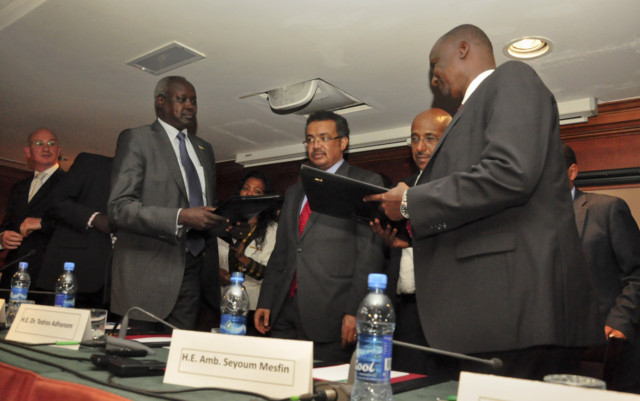
Juba: South Sudanese rebels accused the army of attacking their positions on Friday, claims the military denied, hours before a ceasefire deal agreed by the government and rebels comes into effect.
Rebel spokesman Lul Ruai Koang said “simultaneous attacks have been launched” by the army on rebel positions in the northern oil state of Unity, and in the volatile eastern Jonglei region.
But army spokesman Philip Aguer said he had “no reports of fighting” on Friday, and that clashes in Jonglei had taken place on Thursday morning before the deal was signed, when rebels attacked government forces.
Koang alleged that South Sudanese government troops — as well as Ugandan soldiers and rebels from neighbouring Sudan’s war-torn Darfur region, the Justice and Equality Movement (JEM) — had attacked defensive rebel positions, warning that rebel fighters had the “right to defend themselves against this senseless aggression using all means available at their disposal”.
Aguer dismissed the report, telling AFP that “the situation is quiet.”
The ceasefire agreement was signed late on Thursday in the Ethiopian capital Addis Ababa by representatives of South Sudan’s President Salva Kiir and rebel delegates loyal to ousted vice president Riek Machar, and was greeted by cheers from regional peace brokers and diplomats.
It will come into effect around 1730 GMT on Friday, well after sunset in South Sudan. Up to 10,000 people are believed to have been killed in the fighting pitting forces loyal to Kiir against a loose coalition of army defectors and ethnic militia nominally headed by Machar, a seasoned guerrilla fighter.
Presidential spokesman Ateny Wek Ateny also insisted the situation was calm, and said that orders had already been issued to soldiers “not to fight anybody from now on”.
“As far as I know there is no fighting since yesterday ... no single gunshot anywhere,” Ateny told reporters in Juba on Friday.
“Our forces cannot move towards the rebel areas ... but the rebels also should maintain their line,” he added.
The fighting has been marked by atrocities committed by both sides, and more than half a million people have been forced from their homes during a wave of ethnic violence in the impoverished nation.
However, both sides have said they doubt the other can fully control the forces on the ground.
“We hope the rebels will honour their signature,” Ateny said, but added in a note of caution, “if they have really mandated somebody negotiating on their behalf.”
The fighting has seen waves of brutal revenge attacks, as fighters and ethnic militia use the violence to loot and settle old scores.












